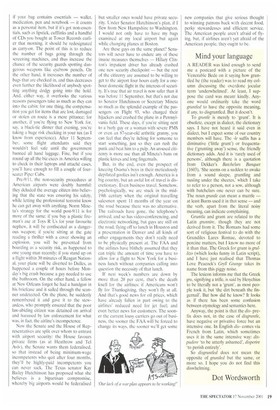Mind your language
A READER was kind enough to send me a postcard with a picture of the Venerable Bede on it saying how gruntied he (the reader) was to read my column discussing the overdone jocular term `underwhelmed'. At least, I suppose the card was meant kindly. Anyone would ordinarily take the word grunded to have the opposite meaning, if any, to disgruntled. But it doesn't.
To gruntle is merely to 'grunt'. It is obsolete, except in dialect, the dictionary says. I have not heard it said even in dialect, but I expect some of our country members will have. The 4e suffix has a diminutive (little grunt') or frequentative ('grunting away') sense, the friendly dictionary adds. And it is 'rarely used of persons', although there is a quotation from Dekker's Batehelars Banquet (1603), 'She seems on a sudden to awake from a sound sleepe, gruntling and nusling under the sheetes,' which I take to refer to a person, not a sow, although with batchelars one never can be sure. The noun gruntle can mean a muzzle — at least Burns used it in that sense — and the verb, apart from the literal noisy meaning, can indicate complaining.
Gruntle and grunt are related to the Latin grunnire, though they are not derived from it. The Romans had some sort of religious festival to do with the Grundiles Lares Romae, devoted to porcine matters, hut! know no more of it than that. The Greek for grunt is gridtizo (which looks funny in Latin script), and I have just realised that Thomas Love Peacock's Gryll Grange takes its name from this piggy noise.
The lexicon informs me that the Greek gru, signifying a trifle, is said by Hesychius to be literally not a 'grunt', as most people took it, but 'the dirt beneath the fingernail'. But how did he know? It looks as if there has been some confusion between etymology and semantics here.
Anyway, the point is that the disprefix does not, in the case of disgruntle, have negative or privative force but an intensive one. In English discomes via French from Latin, which sometimes uses it in the same intensive way: dispudere 'to be utterly ashamed', disperire 'to perish entirely'.
So disgruntled does not mean the opposite of grunded but the same, or more so. I hope you do not find this d iswhelming.
Dot Wordsworth






















































































 Previous page
Previous page